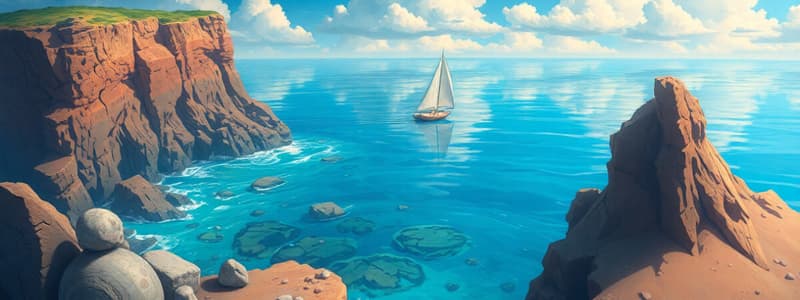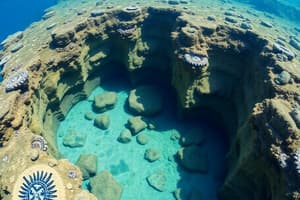Podcast
Questions and Answers
What primary narrative does the ocean floor's landscape reveal, according to the text?
What primary narrative does the ocean floor's landscape reveal, according to the text?
- The patterns of underwater currents.
- The future projections of sea levels.
- The distribution of marine life.
- A detailed history of Earth. (correct)
Why is oceanography considered a significant field of study?
Why is oceanography considered a significant field of study?
- Because oceans are easily accessible and inexpensive to explore compared to land.
- Because oceans are devoid of life and represent a simpler ecosystem to understand.
- Because oceans are primarily composed of freshwater and are essential for agriculture.
- Because the majority of Earth's surface is covered by oceans, which are complex and dynamic systems. (correct)
Which area of study within oceanography specifically investigates the ocean's water composition and its related processes?
Which area of study within oceanography specifically investigates the ocean's water composition and its related processes?
- Geological Oceanography
- Chemical Oceanography (correct)
- Biological Oceanography
- Physical Oceanography
A physical oceanographer would be MOST interested in studying which of the following oceanic phenomena?
A physical oceanographer would be MOST interested in studying which of the following oceanic phenomena?
To comprehensively study the oceans, an oceanographer needs to have knowledge in which combination of scientific disciplines?
To comprehensively study the oceans, an oceanographer needs to have knowledge in which combination of scientific disciplines?
Which aspect of the ocean would a biological oceanographer primarily investigate?
Which aspect of the ocean would a biological oceanographer primarily investigate?
What does the text suggest about the typical work environment of all oceanographers?
What does the text suggest about the typical work environment of all oceanographers?
According to the provided text, the field of oceanography can be described as:
According to the provided text, the field of oceanography can be described as:
Geological oceanographers primarily contribute to our understanding of:
Geological oceanographers primarily contribute to our understanding of:
Besides providing habitats for marine organisms, oceans significantly influence terrestrial life by:
Besides providing habitats for marine organisms, oceans significantly influence terrestrial life by:
Flashcards
What is oceanography?
What is oceanography?
The study of oceans, including their physical, chemical, biological, and geological aspects.
What are the scientific fields involved in oceanography?
What are the scientific fields involved in oceanography?
A diverse group of scientific disciplines including chemistry, biology, geology, geography, and physics, all intertwined and influencing each other.
What is biological oceanography?
What is biological oceanography?
Oceanographers focusing on marine life, including their interactions, adaptations, and ecosystems.
What is geological oceanography?
What is geological oceanography?
Signup and view all the flashcards
What is a fish school?
What is a fish school?
Signup and view all the flashcards
What is physical oceanography?
What is physical oceanography?
Signup and view all the flashcards
What is chemical oceanography?
What is chemical oceanography?
Signup and view all the flashcards
How do some oceanographers do their work?
How do some oceanographers do their work?
Signup and view all the flashcards
Where do oceanographers collect data?
Where do oceanographers collect data?
Signup and view all the flashcards
What is the scope of oceanography?
What is the scope of oceanography?
Signup and view all the flashcards
Study Notes
Oceanography Overview
- Oceanography is the study of Earth's oceans, covering a vast and dynamic environment.
- About 70% of Earth's surface is water, primarily saltwater oceans.
- A significant portion (approximately 80%) of the world's organisms live in the oceans. Many live at great depths, requiring robotic exploration.
- Ocean life influences and is influenced by the environment, including the composition of ocean water, the sea floor, and the atmosphere.
- Oceanographers need expertise in diverse fields like chemistry, biology, geology, geography, and physics, as these are intertwined and affect each other.
Sub-Disciplines of Oceanography
- Biological Oceanography: Studies the biological aspects of oceans, including organism communities (e.g., fish schools, coral reefs), species adaptation, migration, sounds (like whale songs), food webs, and more.
- Geological Oceanography: Examines the shape and composition of the ocean floor, tracing Earth's geological history through seafloor samples and changes over time. The ocean floor contains a wealth of data about the planet if interpreted properly.
- Chemical Oceanography: Focuses on the composition and processes of ocean water, connecting water chemistry to biological organisms, atmospheric conditions, acidification, currents, and pollution.
- Physical Oceanography: Studies the physical properties of oceans, such as temperature, density, waves, tides, and currents, relating them to the sea floor and atmosphere.
Oceanographic Research Methods
- Different oceanographers use various methods, ranging from fieldwork at sea or in remote locations to computer modeling.
- Some oceanographers spend extended periods in polar regions (e.g., North or South Pole), collecting data from remote areas.
- Oceanographers use ships or computers for research.
- Some oceanographers conduct their research completely on land, utilizing data analysis and modeling.
Studying That Suits You
Use AI to generate personalized quizzes and flashcards to suit your learning preferences.




